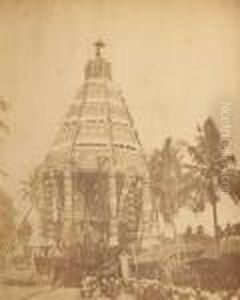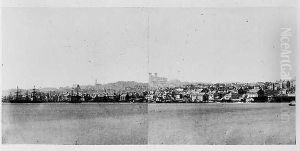Paul Emile Miot Paintings
Paul Emile Miot was a French naval officer and pioneering photographer born in 1827. Though primarily known for his career in the French Navy, Miot developed a significant interest in photography, which was a relatively new medium at the time. His work as a photographer during the mid to late 19th century is notable for its early contribution to the field of ethnographic and landscape photography, particularly in the context of his naval voyages.
Miot's naval career offered him the opportunity to travel extensively, especially to areas that were, at the time, largely unexplored by Europeans. It was during these voyages that he took the opportunity to photograph the places he visited, including Newfoundland and the Caribbean, among others. His photographs from Newfoundland are particularly valued for their historical significance, capturing images of the indigenous Beothuk artifacts and the landscapes that were relatively untouched by European influence at the time.
Miot was among the first to apply the wet plate collodion process in field photography, a method that required the photographic material to be coated, exposed, and developed on site within a very short window of time, making the process quite challenging in the unpredictable conditions of his travels. Despite these challenges, Miot managed to produce a significant body of work that provides valuable insights into the cultures and landscapes of the 19th century.
His contributions to photography were recognized in his time, though he remained primarily dedicated to his career in the navy. After his retirement, Miot's work gained further recognition, and today, he is celebrated not only as a naval officer but also as one of the early pioneers of photography. His photographs are considered important documents of their time, offering a glimpse into the world of the 19th century through the lens of an officer and an artist. Paul Emile Miot passed away in 1900, leaving behind a legacy that bridges the world of maritime exploration and the early days of photography.

